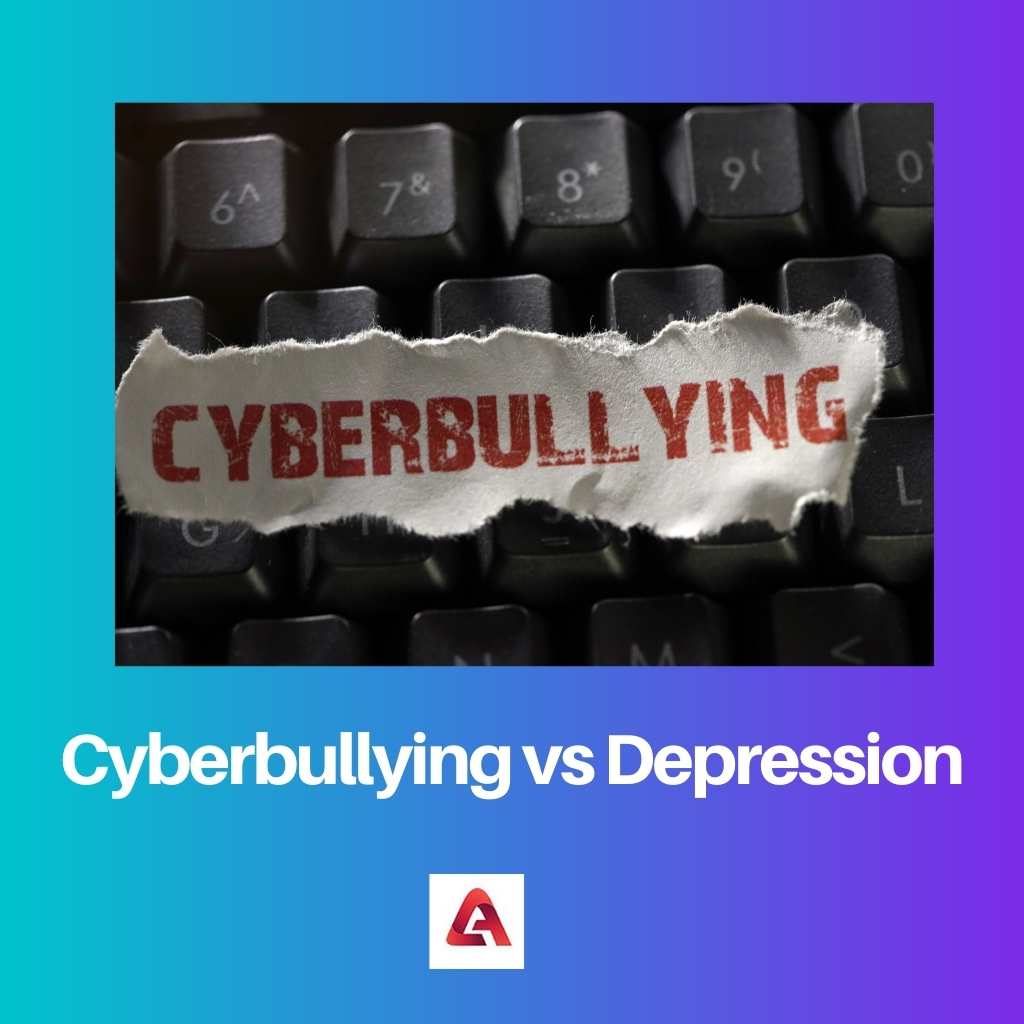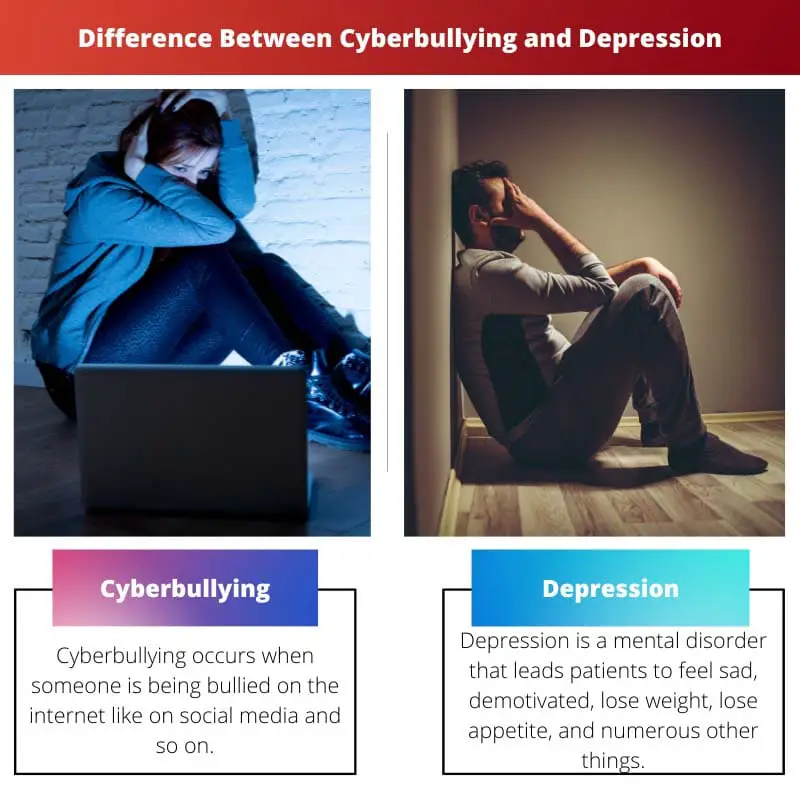Cyberbullying versus depression doesn’t seem very different, but these two things are different from each other.
Both cyberbullying and depression are serious things that shouldn’t be mocked and should be talked about openly to understand people suffering from it and encourage them to live better lives.
Key Takeaways
- Cyberbullying involves aggressive online behavior targeting individuals, while depression is a mental health disorder affecting mood and overall well-being.
- Cyberbullying can contribute to depression, but depression can also arise from various other causes.
- Tackling cyberbullying requires addressing the harmful behavior, while treating depression involves psychological and medical interventions.
Cyberbullying vs Depression
Cyberbullying is the use of technology to hurt someone. It is threatening, hostile, or aggressive behavior that occurs through the internet. Depression is a mental disorder. It occurs with harmful thoughts, like thoughts of self-loathing, fatigue, and difficulty concentrating.

Cyberbullying is a term that refers to threatening, aggressive, or hostile behavior that occurs through the internet, email, or cell phones.
Cyberbullying can be in the form of text messaging, phone calls, chat rooms, instant messaging, emails, social networking sites, or websites.
It can happen to people of any age and is becoming increasingly more common.
Depression is a common mental disorder that occurs in tandem with thoughts of self-loathing. However, depression has several symptoms that can affect a person’s day-to-day life.
For example, depression can cause fatigue and difficulty concentrating. It is best to consult a therapist or any trusted individual if depression is suspected.
Comparison Table
| Parameters of Comparison | Cyberbullying | Depression |
|---|---|---|
| Meaning | Cyberbullying occurs when someone is being bullied on the internet like on social media and so on. | Depression is a mental disorder that leads patients to feel sad, demotivated, lose weight, lose appetite, and numerous other things. |
| Occurrence | Cyberbullying occurs to almost 25% of teens on the internet. | According to WHO, 3.8% of the total population is affected by depression. |
| Causes | Cyberbullying occurs due to various reasons as seen fit by the bully to trouble the victim. | Depression can occur due to environmental, physical, and even genetic factors. |
| Prevention | Cyberbullying can be prevented and stopped by responsible use of the internet. | Depression can be prevented by leading a happy and productive and fulfilling life. |
| Severity | Cyberbullying can become severe and become a reason for depression or even suicide if left unchecked. | Depression in itself is a very serious issue and should not be neglected as it can lead to other physical and mental disorders or even suicide. |
What is Cyberbullying?
Cyberbullying is the use of technology to bully, harass, and abuse someone else. Cyberbullying is something that happens on the Internet.
As with traditional bullying, cyberbullying can have devastating effects on the victim, especially children and teenagers who rely so much on their cell phones.
You can discourage cyberbullying by learning to identify and prevent cyberbullying and by making sure your child or teenager is safe and secure. This can happen in different ways, but one way is through the use of a mobile device.
Since technology has grown in today’s world, it has become easier to bully others.
This convenience has also made it easier for others to be victimized. Statistics show that as much as 87% of young adults are victims of cyberbullying.
Cyberbullying/online harassment is when someone threatens you, hurts you, messes with your reputation, or makes you feel bad about yourself using digital methods.
This can happen through chat or posts on social media, emails, or messages through websites or apps. These can happen whether you are online, on your phone, or somewhere else that has internet.
Cyberbullying can be hard to deal with. It may cause depression and anxiety, and in extreme cases, suicide.

What is Depression?
Depression is a state of low mood and aversion to activity that lasts for at least two weeks. It is accompanied by a loss of interest or pleasure in normally enjoyable activities along with low self-esteem and feelings of helplessness, hopelessness, and worthlessness.
Depression is not the same as a passing blue mood, which is a feeling of sadness. It can occur along with other mental or physical illnesses.
Depression is a common and serious medical illness with terrible effects on its sufferers, their families, and society in general. Depression, however, is not difficult to treat.
Several medications can help stabilize the individual’s feelings of worthlessness, and there are also mental health specialists who can help. Depression is a symptom, not a cause.
It’s a signal, something important you should be aware of. It calls for an investigation.
Depression is a mood disorder. It causes hopelessness, sadness, and lethargy.
It is characterized by long periods where a person struggles to feel anything at all. Depression is different than regular sadness or grief.
It’s a chronic medical condition. Depression also tends to affect your relationships and ability to enjoy activities you normally enjoy.
Another aspect of depression is that it affects your physical health. People with depression are at a higher risk of heart disease, obesity, diabetes, and other medical issues.

Main Differences Between Cyberbullying and Depression
- Cyberbullying can result in depression, decreased self-esteem, and even suicidal thoughts, but vice versa is not common.
- Cyberbullying is different than depression because, in cyberbullying, people will say mean things to other people. In depression, people can lose the will to do things.
- Cyberbullying occurs for a short period, depression lasts longer.
- Cyberbullying is caused by being bullied on the internet. Depression can be caused by several factors, including environmental and genetic factors.
- Cyberbullying can be prevented or cured completely by eliminating the source of bullying, but depression has no cure. It can only be treated.




